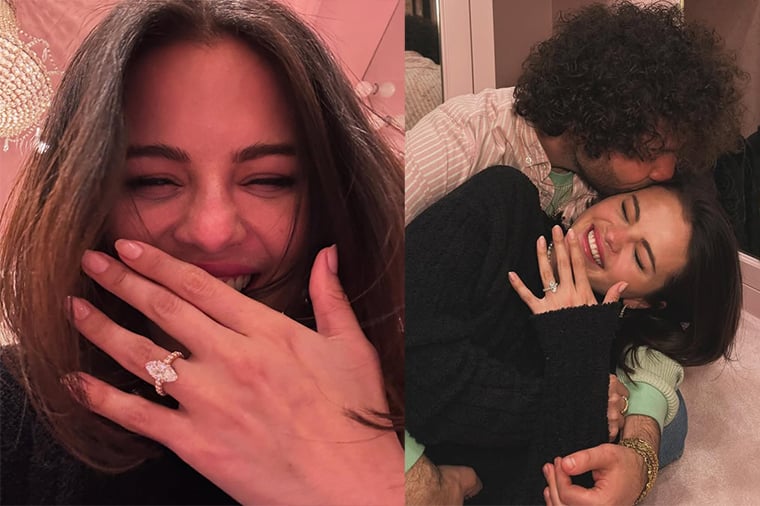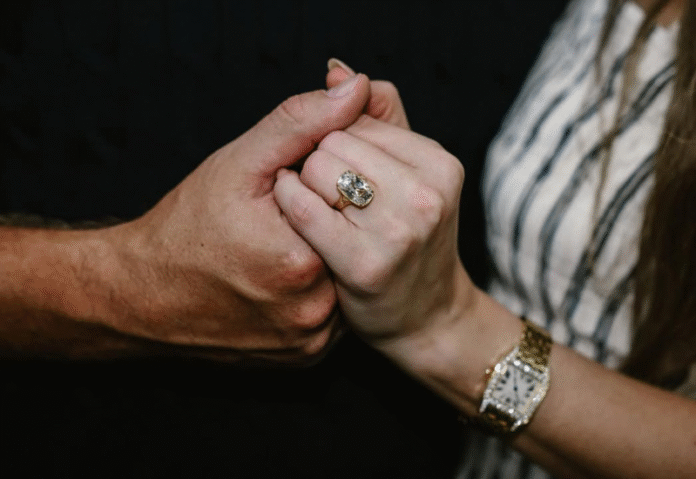With so many marquee marriage proposals flooding our feeds, perhaps it’s time to ask the question – how do we keep from losing ourselves when we finally say “I do”?
When Taylor Swift announced her engagement earlier this year, the internet exploded with speculation, hashtags, and hot takes. Giorgina Rodriguez, long-time partner of Cristiano Ronaldo, has also been flashing her 35 carats, five million dollar ring with quiet confidence. And let’s not forget all the congratulatory messages Selena Gomez’s 417M followers on instagram sent her way when she announced her impending nuptials with Benny Blanco. For many women, these moments spark celebration. But they also raise an age-old question: how does a woman step into marriage without stepping out of herself?
According to Dr. Valentina Faia, a seasoned psychiatrist and couples therapist with over 20 years of experience based in Dubai, the stakes are especially high for women. “This is actually, as a name in psychology, it’s called relationship-contingent self-esteem, which means that the self-esteem of individuals relies a lot on the well-being of their relationship,” she explains. “That is especially true for women, because the majority of women who come to Dubai are following their husbands. So the health of their relationship is the wealth of their life.”
That reality, argues the doctor, makes it all too easy for women to lose sight of their own needs, ambitions, and individuality once the vows are exchanged. Her mission, at the BioPsychoSocial Clinic in Dubai’s Knowledge Village, is to help them avoid fate.
At the clinic Dr. Faia runs a pre-marriage program designed to shake couples out of what she calls the “love bubble.” She described it simply: “The reality is that what the program does is that it pulls the two individuals out of the bubble, the emotional love bubble… and brings back into focus the fact that they are two individuals with completely different backgrounds, histories, personal expectations, values and motivations.”
That reminder is crucial. Too often, couples glide toward marriage assuming that the future will naturally fall into place. But Dr. Faia has seen how dangerous that can be. “People divorce because they have never wanted to address the elephant in the room, which can be related to how they deal with money, that he’s cheating regularly, or that they come from different backgrounds in terms of spirituality and religion, and they simply don’t fit with each other. And they decided to ignore these issues because they were in love.”
Her approach is to bring those “nasty parts” into the light. Over the span of 9 to 11 90-minutes sessions that take place every two weeks during the months leading up to a wedding hot button topics like finances, intimacy, religion, family dynamics, parenting and career goals are confronted by the couples in a safe space, before it’s too late.
One of the most common traps women fall into, Dr. Faia says is the ingrained belief that marriage demands self-sacrifice from them. “Typically it is the women in the couple who have lost themselves…because of the nature of what femininity is, which is nurturing, which is taking care of others, putting the needs of others first. This is the myth of sacrifice.” The cost, she warns, is often a woman’s sense of self. “Ninety percent of the women here moved to Dubai to follow their husbands. They left behind, careers, personal hobbies, expectations, families, friends, everything. So the idea is actually to bring back a little bit of what the individual person is – the woman, what she has.” But Dr. Faia’s advice is deceptively simple: hold on to what makes you you.
She explains that one of the most powerful safeguards against this loss of identity is for women to maintain the personal friendships that she has cultivated outside the couple. “This is my number one recommendation: keep your inner circle. Keep your relationships alive. Keep your independence.”
Dr. Faia acknowledges that balance in any couple naturally shifts over time – especially with children, postpartum struggles, or career pressures. But the key is awareness. “The point is to be attuned. Not keep the things bottled up and talk about issues when they first appear.”
That awareness extends to boundaries, too. Couples in her program are encouraged to ask: what is acceptable, and where are the lines that can’t be crossed. It’s a conversation that, surprisingly, many never have. “It’s not a typical conversation you have. The conversation around children is the conversation about your future. The conversation around money is really about the issue of independence. The intimacy expectations are so incredibly powerful. Especially when you come from different cultural backgrounds, that might trigger a lot of unexpected revelations about the other person,” Dr. Faia reveals.

One of the most striking insights the doctor shares is that a marriage is not just about two individuals – it’s about creating something entirely new. “When I’m sitting in a room with a couple, there is me, there are two individuals, and there’s a fourth person. And the fourth person is the couple.” That couple, she insists, must be treated like its own entity. “You have two tasks in a marriage, in my opinion: you take care of yourself, and you take care of the couple. You don’t take care of the man. You take care of the couple by taking care of the territory you built together.” It’s a reframing that allows women to avoid being consumed by the role of caretaker. By nurturing both themselves and the couple, they preserve their own identity while strengthening the relationship.
Underlying all of this, Dr. Faia explains, is a paradox every marriage must navigate: the tension between autonomy and relatedness. “Autonomy is the free will of the individual to establish their own path and their own journey, and the relatedness, the tendency to relate to the other person, to get closer and to try and work together. And this is a constantly evolving dynamic.” The push and pull may never be perfectly resolved, but it doesn’t have to be. The secret, she suggests, is in “fine-tuning” that balance, resisting perfectionism, and staying honest about one’s own needs.
Dr. Faia also confirms what we all know deep down, that the “love bubble” of any relationship will always inevitably pop. The couples who endure are those who accept imperfection, embrace tough conversations, and protect their individuality while nurturing the shared identity of the couple.
As marriage announcements flood our feeds, it’s tempting to get swept up in the fantasy of forever love. But the lesson from Dr. Faia is clear: keeping yourself in marriage is not about clinging desperately to independence or disappearing into sacrifice. It’s about balance. “By taking care of yourself, you’re taking care of the couple,” she insists. “We have multiple identities… and our identity as a couple is one of them. That’s what you work towards, both of you.” And that, perhaps, is the most important vow of all.
– For more on luxury lifestyle, news, fashion and beauty follow Emirates Woman on Facebook and Instagram
Images: Supplied
Disclaimer : This story is auto aggregated by a computer programme and has not been created or edited by DOWNTHENEWS. Publisher: emirateswoman.com







